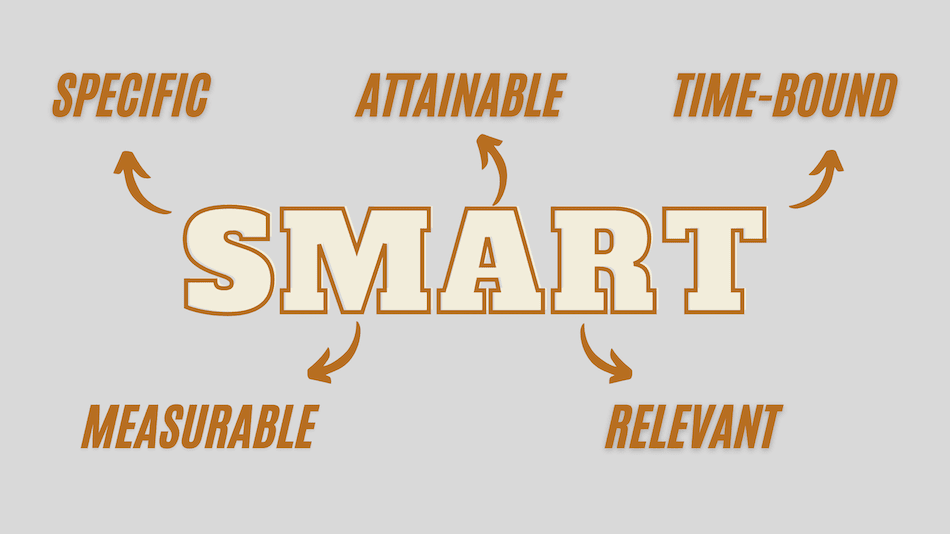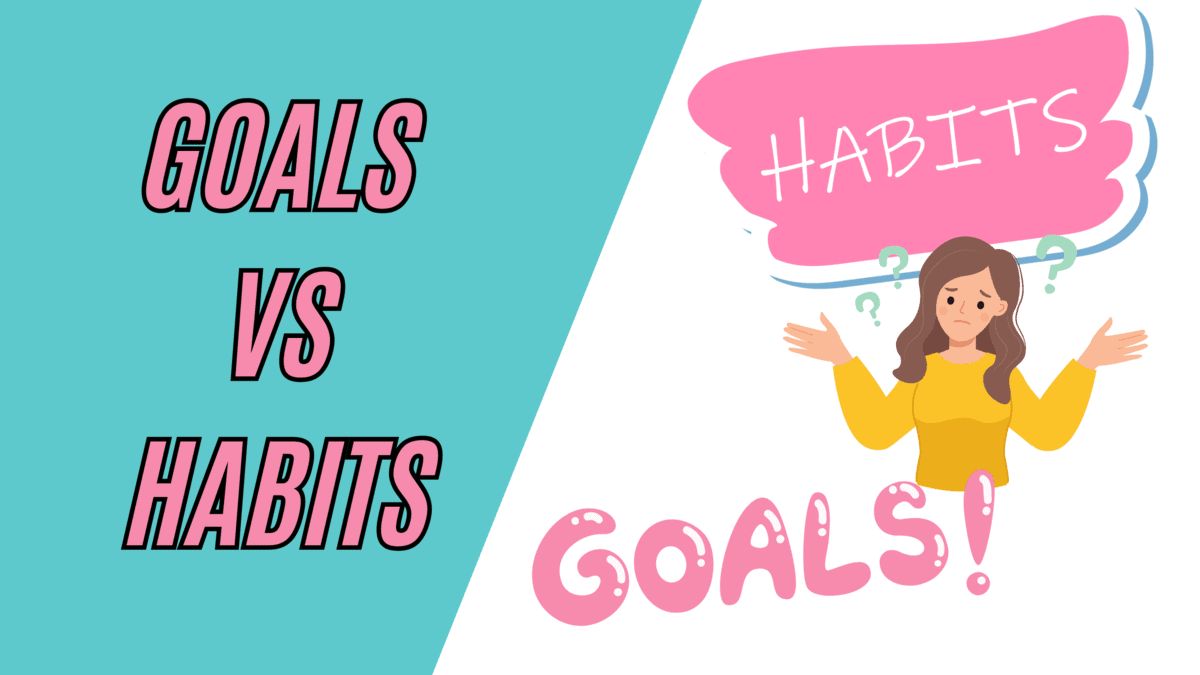We often hear the terms “habits” and “goals” in the context of personal development. But do we really understand the difference between these two concepts?
Setting a goal involves defining a specific, desired outcome to achieve in the future. On the other hand, creating a habit involves establishing a regular pattern of behavior that becomes automatic over time. In essence, goals are about what you want to achieve, habits are about the regular actions you take to get there.
So, let’s delve deeper into what goals and habits are, how to set effective goals and build positive habits, and why it’s important to do both.
Key Takeaways
- Goals vs Habits: Goals are your desired outcomes, habits are the consistent actions leading to those outcomes.
- Effective Goal Setting: Make your goals SMART – Specific, Measurable, Achievable, Relevant, and Time-bound to help stick to them
- Habit Building: Construct positive habits that align with your goals for steady progress.
- Power of Consistency: Small, consistent actions accumulate over time leading to significant results. Start today!
What Are Goals

Goals are the milestones we strive to reach, the targets we aim for. They represent our desired achievements and outcomes.
Whether it’s saving $10,000, getting a piece of writing published in a reputable publication, launching a new stream of income, or transitioning to a 4-day working week, every significant achievement starts with setting a goal.
Goals provide us with a sense of direction and purpose. They help us focus our efforts and resources on what truly matters to us.
They’re usually long-term, but they can also be short-term stepping stones leading to a larger objective.
How to set effective goals
There’s no one-size-fits-all method to setting goals. However, there are a few strategies that can make your goal-setting more effective.
Start at the top: Begin by envisioning your future. Where do you see yourself in 1 year? In 5 years? Start with these long-term goals, then break them down into smaller, more manageable annual, quarterly, monthly, and weekly goals. This approach will give you a clear roadmap to your ultimate destination.
Make your goals SMART: SMART stands for Specific, Measurable, Achievable, Relevant, and Time-bound. This acronym is a helpful reminder of the characteristics of effective goals.
An example of a SMART and not so SMART goal

Not so SMART goal: “I want to save more money“
SMART goal: “I want to save $10,000 in 12 months by setting aside $850 each month.” This goal is specific (save $10,000), measurable (you can track your progress every month), achievable (it’s realistic with your current income), relevant (it aligns with your financial objectives), and time-bound (you have a clear deadline of 12 months).
Remember, the key to successful goal setting is to keep your goals aligned with your values and aspirations. They should inspire and motivate you to strive for greater heights. After all, they’re the stepping stones to your dream life!
Why Set Goals
Setting goals is a powerful process for personal and professional growth. But why exactly should we set goals?
Let’s delve into the reasons.
Clarity and Focus
Goals provide clarity by helping you identify what is truly important to you. They allow you to focus your time and resources efficiently, guiding your actions toward activities that help you achieve these objectives.
Goals can help you avoid distractions and maintain your focus on the tasks that truly matter. They can serve as your compass, guiding you through the hustle and bustle of life towards your desired destination.
Motivation and Commitment
Goals give you something concrete to strive for, providing a sense of purpose and direction. This can be incredibly motivating, especially when the goals are challenging yet achievable.
The process of setting goals involves identifying something meaningful and important to you, which can increase your commitment to pursuing them. It’s like setting a personal challenge for yourself, a challenge that you’re motivated to overcome.
Measuring Progress and Achievements
Goals also provide a benchmark for measuring your progress. Without goals, it can be hard to gauge how far you’ve come and what you’ve accomplished. They allow you to see the steps you need to take and the progress you make along the way. This can be incredibly satisfying and encouraging. As the saying goes “What gets measured gets managed.”
In our own journey from side hustlers to successful digital nomads, setting goals has been a crucial part of our success. It has provided us with a clear roadmap, motivated us to push through challenges, and allowed us to measure our progress and celebrate our achievements.
What Are Habits

Habits are routine behaviors or practices that we perform regularly, often without much conscious thought. They can be daily, weekly, or even monthly routines that become a part of our lifestyle.
From drinking coffee first thing in the morning to going for a walk after lunch, habits shape our day-to-day lives in many ways.
Habits can also play a crucial role in achieving our goals. Building new, positive habits, or breaking negative ones, can help us consistently progress towards our long-term goals.
Examples of habits to build or break to meet goals
Let’s look at some examples of habits that can help you achieve the goals we mentioned earlier:
- Save $10,000: Develop a habit of saving a certain percentage of your income each month. This could involve automating your savings so that a portion of your income is transferred to your savings account as soon as you get paid.
- Get a piece of writing published in a reputable publication: Set aside dedicated time each week for writing and editing. You could also make it a habit to reach out to a new publisher every week.
- Launch a new stream of income: Instead of spending your evenings watching Netflix, dedicate a few evenings each week to learning about and working on a potential side hustle.
- Transition to a 4-day working week: Regularly review your work processes and systems to identify areas where you can increase efficiency or outsource tasks. This could be a monthly habit that helps you gradually reduce your working hours without compromising your productivity.
Building positive habits is just as important as setting ambitious goals. It’s the small, consistent actions that add up to significant results over time.
Why Build or Break Habits?
While setting goals gives us a destination to aim for, building or breaking habits is what drives us towards that destination. Here’s why it’s so important to focus on our habits:
- Consistency: Habits ensure consistent action towards our goals. They reduce our reliance on motivation or willpower, which can be fleeting. Instead, they make our desired actions automatic, making it easier for us to maintain consistency in our efforts.
- Efficiency: Habits help to automate certain behaviors, saving us mental energy for more complex tasks and decision-making. By turning beneficial actions into habits, we can perform them with less conscious effort, making our daily routines more efficient.
- Progress Tracking: Habits provide a clear framework for tracking our progress towards our goals. By observing our consistency in performing certain habits, we can gauge how well we’re doing in our pursuit of our goals.
- Long-Term Success: Habits foster long-term changes and sustainable goal achievement, as opposed to temporary efforts. They help us make lasting changes in our lives, which is essential for achieving and maintaining our goals.
- Breaking Negative Habits: Just as building positive habits can move us closer to our goals, breaking negative habits can remove obstacles on our path to success. Whether it’s procrastination, unhealthy eating, or excessive spending, eliminating detrimental habits can make our goal attainment more accessible and healthier.
The difference Between Setting a Goal and Creating a Habit
| Goal Setting | Habit-Building | |
|---|---|---|
| Purpose | Identifying a specific target or achievement | Creating consistent patterns of behavior |
| Time Frame | Often set with a deadline or end point. | Ongoing actions without a fixed duration |
| Focus | On outcomes or results | On the processes and regulatory of actions |
| Flexibility | Goals can be adjusted or changed easily | Habits require time to establish and change |
| Measurement | Progress measured by proximity to target | Measured by consistency and regularity |
| Motivation | Requires sustained motivation and discipline | Once established, performed automatically |
Conclusion & Final Thoughts
Understanding the difference between setting goals and creating habits is a game-changer in personal and professional growth.
While goals give us a direction and an endpoint, habits are the vehicle that drives us toward that destination. They are the small, consistent actions that accumulate over time to produce significant results.
So, whether you’re aiming to save $10,000, or transition to a 4-day working week, remember to focus not just on the goal, but also on the habits that will get you there.



